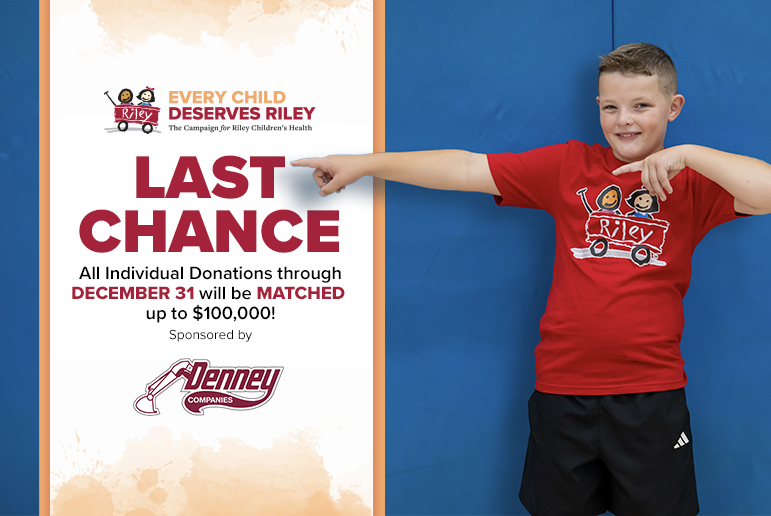A Colts Superfan’s ‘Best Thing Ever’

Thanks to the research and expertise at Riley Children’s Health, when you ask 13-year-old Colts superfan Eli Otero to describe himself today, there’s no hesitation. “Awesome,” says the eighth grader from Hobart, Indiana. “Happy. More confident.”
Just over two years ago, it was quite a different description. Eli has seen specialists at Riley Children’s Health since he was referred there as a baby for severe jaundice. He was ultimately diagnosed with a rare genetic condition affecting his liver: Alagille syndrome. His malformed bile ducts caused severe jaundice and xanthomata — collections of cholesterol under his skin that showed up as white bumps all over his body. “It was so painful,” says his mother, Joy Huley. “He couldn’t play sports. Holding a pencil, putting his clothes on, and walking was a problem. He did not sleep at night — he was always itching. It was horrible to watch.”
Riley Children’s Gastroenterologist and Division Chief of Gastroenterology Jean Molleston, M.D., guided Eli and his family through treatment options over the years. Because Riley is an academic pediatric research center, Eli was able to enroll in a clinical trial for a drug, maralixibat, that helped with his itching and later gained FDA approval. Over time, it became clear no medicine was going to give Eli the quality of life he deserved. He was withdrawing more and more, tired of the stares, comments and discomfort. His family and Dr. Molleston had one more high-stakes option to consider: a liver transplant.
“I told her, ‘I want our son to have a life,’” says Joy. “I want him to not be in pain. I want him to be a normal kid. And she said, ‘Let’s do it.’ That was the best decision we ever made as a family, and I call Dr. Molleston ‘family’ because she is.”
In February 2020, Eli and his family got the life-changing call. His transplant surgery, led by Riley Surgeon Richard (Shane) Mangus, M.D., the director of Riley’s pediatric liver transplant program, went beautifully. “When he started waking up, he couldn’t stop smiling,” says Elias Otero, Eli’s father. “He said, ‘Dad, I feel different. I have energy. I’m not itching.’”
“It was so, so cool,” says Dr. Molleston, who saw a remarkable difference in Eli just a few months post transplant. “In my note I said the xanthomatas were melting away.” The family appreciates not only the excellent medical care Eli received, but the compassion and love too. “Everybody always calls them Riley angels,” says Elias. “They treat us so well.” The appreciation goes both ways according to Dr. Molleston. “Eli’s parents make the concept of shared decision making come alive. It’s such a joy to work with them,” she says.
To donors who support Riley and its research programs, the family has deep gratitude. “You guys are a blessing,” says Joy. “You make a difference to the families who are concentrating on their kids getting well.” Eli has this message for his Riley caregivers: “I love them. Thanks for helping me get my second life. It’s the best thing that ever happened to me.”
